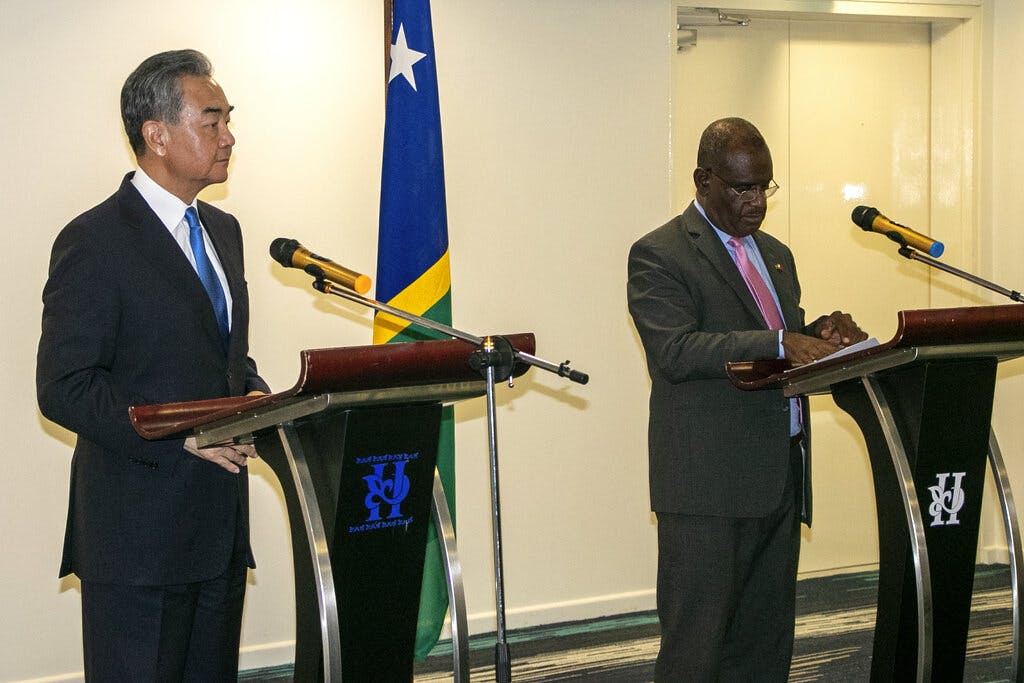Biden Aides Sowing Confusion With ‘Strategic Ambiguity’ Regarding Free China, a Critic Says, as Communist China Eyes the Solomons
‘We need to respond to this because this is China seeking to increase its influence in the region of the world where Australia has been the security partner of choice since the Second World War,’ Australia’s newly elected prime minister said.

While Secretary of State Blinken sounded conciliatory notes in today’s long-awaited speech detailing America’s policy on Communist China, his Beijing counterpart, Wang Yi, went island-hopping to consolidate his country’s dominance over strategic spots in the Pacific.
“We are not looking for conflict or a new Cold War,” Mr. Blinken said in his speech. “To the contrary, we’re determined to avoid both.” He repeatedly invoked the concepts of “international order” and “universal values” in detailing America’s policy of confronting, and appeasing, Xi Jinping’s China.
While Mr. Blinken spoke, Mr. Wang was on a tour of several strategically located Pacific Islands. He launched the trip yesterday at the Solomon Islands, where one of the most definitive World War II battles helped America gain control in the Pacific.
Prior to Mr. Wang’s arrival, Beijing issued a five-year “action plan on common development” between island nations and the Communist regime. In a draft of the plan, seen by the Sun, Beijing vows to appoint a “government special envoy for Pacific islands government affairs” and proposes cooperation in, among other areas, policing, economics, education, and the environment.
The draft, however, avoids mentioning any military aspects of Beijing’s newly assertive role in the islands, some of which are as close as a two-hour flight away from Australia. Canberra is worried.
“We need to respond to this because this is China seeking to increase its influence in the region of the world where Australia has been the security partner of choice since the Second World War,” Australia’s newly elected prime minister, Anthony Albanese, said yesterday.
To allay Western fears, Mr. Wang said yesterday that “there is no intention at all to establish a military base” on the Solomons. Yet, a Chinese defense pact with the Solomon Islands was signed in secret, and even the island’s residents don’t know what is in it.
In recent years the People’s Liberation Army forcibly captured several South China Sea islands where the Philippines, Vietnam, and other neighbors claim sovereignty. Initially denying military intentions, the PLA nevertheless built military bases and airports on those islands.
In Washington, meanwhile, Mr. Blinken largely defined America’s policy toward China in terms of international law and world governance, and avoided talking about American interests.
“We must defend and reform the rules-based international order,” Mr. Blinken said, “the system of laws, agreements, principles, and institutions that the world came together to build after two world wars to manage relations between states, to prevent conflict, to uphold the rights of all people.”
The American state secretary added that “arguably no country on Earth has benefited more from that than China.” Yet, he said, now Beijing is “undermining” the rules and “under President Xi the ruling Chinese Communist Party has become more repressive at home and more aggressive abroad.”
In reality, Red China increasingly dominates international institutions like the United Nations, so it still benefits quite nicely from that post-war global infrastructure. This week the UN high commissioner for human rights, Michelle Bachelet, is visiting China.
Ms. Bachelet’s trip included a stop in Xinjiang, where America termed the oppression of the Uighors “genocide.” There, she was accompanied by Communist Party minders, so she studiously avoided terms like concentration camps and re-education camps.
Instead she next appeared together with Mr. Xi at Beijing, giving the Chinese strongman cover against accusations of human rights violations. The State Department’s spokesman, Ned Price, called Ms. Bachelet’s trip a “mistake.”
Mr. Blinken denounced Mr. Xi’s increasingly aggressive policies on Taiwan, which Beijing considers a breakaway Chinese province. However, Mr. Blinken also carefully walked back President Biden’s statement on Taiwan’s defense.
Last week, while on a trip to Tokyo, Mr. Biden said “yes” in response to a question about American military intervention in case Red China invaded the free island. Taipei’s foreign ministry immediately expressed “welcome and gratitude” for Mr. Biden’s change of America’s policy. Taipei also vowed to beef up investment in Taiwan’s own defenses.
Since then, however, Defense Secretary Austin, the director of national intelligence, Avril Haines, and other administration officials — including Mr. Blinken today — reiterated that there is “no change” in America’s decades-old policy of “strategic ambiguity.” According to that writ, America would provide Taiwan the means to defend itself, but, presumably, not intervene militarily.
In today’s latest installment of the Sages of the Sun podcast, a Council on Foreign Relations Taiwan watcher, David Sacks, noted that Mr. Biden has said that America would intervene militarily in case the PLA invaded the island twice before his Tokyo trip — and Beijing didn’t escalate in response.
By walking back the commander in chief’s statements, Mr. Sacks said, Mr. Biden’s aides are “sowing confusion among our allies and creating a picture of dysfunction” in Washington.
“I think strategic ambiguity has served its purpose for four decades, with a much weaker China militarily and a much stronger United States,” Mr. Sacks said, but now, “I don’t think strategic ambiguity is sufficient to deal with Xi Jinping’s China.”
Similarly unclear is Washington’s response to Beijing’s takeover of strategic islands in the Pacific. On that, America is following the lead of Australia and New Zealand, a long-time watcher of the region, Cleo Pascal, says.
However, these capitals are yet to articulate a coherent policy. “I suspect they don’t know what to do,” Ms. Pascal told the Sun, “the Chinese are not behaving like they are supposed to.”

